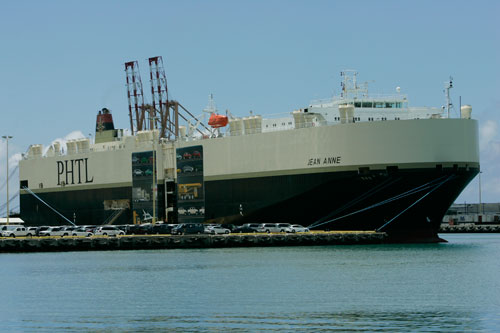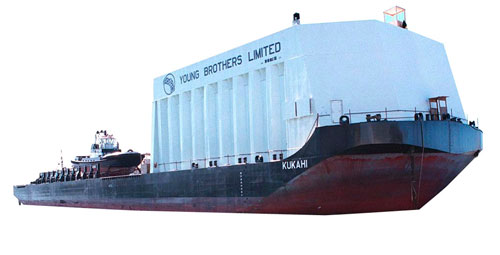Pasha gets green light

Pasha Hawaii Transport Lines LLC is expected to begin interisland shipping within the next three months after the state gave its approval to enter the regulated shipping market previously served only by Young Brothers, Ltd. Above, Pasha Hawaii Transport Lines' ship the Jean Anne is docked at Honolulu Harbor.

The Kukahi, a barge operated by Hawaiian Tug & Barge Corp. and Young Brothers Ltd., arrives at Honolulu Harbor with its tugboat, Mamo, on board.


Pasha Hawaii Transport Lines LLC expects to begin interisland shipping of vehicles and other wheeled cargo within the next three months, after obtaining state approval Monday to enter the regulated market previously served exclusively by Young Brothers, Ltd.
The new competition will test whether interisland shipping in Hawaii is a "natural monopoly" where one company can provide service at a lower cost, or whether two competing carriers can better serve customers.
The state Public Utilities Commission tentatively approved Pasha’s service through Dec. 31, 2013, pending an analysis leading to a final determination that could retract the approval or make it permanent.
Roy Catalani, a Young Brothers vice president, said yesterday that the company is reserving comment because it is still reviewing the PUC’s decision and evaluating its options.
Pasha spokeswoman Joelle Vossbrink extended thanks to customers who encouraged the company to get into the interisland shipping business.
Pasha’s entry will be the first time since statehood that shipping between Hawaiian islands has been open to competition. The new service will provide another option for transporting cars and other cargo that can be carried on wheels such as boats, construction equipment and building materials.
Don't miss out on what's happening!
Stay in touch with breaking news, as it happens, conveniently in your email inbox. It's FREE!
YOUNG BROTHERS, LTD. » Base: Honolulu
PASHA HAWAII TRANSPORT LINES LLC » Base: Corte Madera, Calif. Source: Young Bros., Pasha Hawaii |
However, the competition won’t be head-to-head because Pasha will serve only the largest neighbor island ports, will provide less frequent service than Young Brothers and will carry only cargo that can be driven onto its ship, excluding livestock and refrigerated cargo.
Pasha’s service, which offers enclosed cargo space, is priced comparably or above rates of Young Brothers, which carries its cargo on barges, according to the PUC.
Pasha said it expects to begin service in the fourth quarter with its 579-foot ship the Jean Anne designed for roll-on, roll-off cargo.
The Jean Anne is scheduled to call in Honolulu, Kahului and Hilo every two weeks. Additional stops on Kauai at Nawiliwili Harbor and Oahu at Kalaeloa Harbor and Pearl Harbor would be upon customer request.
No stops are possible on Molokai or Lanai because the harbors there are too small for Pasha’s ship.
The service represents an expansion for California-based Pasha, which launched cargo service between San Diego and Hawaii in 2005.
Pasha now calls in Honolulu, Kahului and Hilo every two weeks, but is restricted to delivering cargo between the mainland and the Hawaiian islands. Transporting cargo between Hawaii ports was prohibited under the Hawaii Water Carrier Act without regulatory approval.
Pasha petitioned the PUC for approval in March 2009. The case was contested by the carriers, and drew opposing views from local economists, shipping customers and government leaders.
Young Brothers contended that it would lose valuable business to Pasha that could lead to reduced service or higher prices, particularly on more costly routes such as Molokai and Lanai.
Young Brothers, a division of Seattle-based Saltchuk Resources Inc., operates 12 round-trip sailings a week from Honolulu using a fleet of eight tugs and barges that stop three times a week on Maui, once a week on Lanai and twice a week on Kauai and Molokai. Four stops a week on the Big Island are divided between Hilo and Kawaihae harbors.
Local farmers, cattle ranchers and food service companies expressed concern that Young Brothers might eliminate farm and ranch discounts subsidized by rates on other goods.
In the PUC case, local economists Paul Brewbaker of TZ Economics and University of Hawaii professor Sumner La Croix testified in favor of Young Brothers, saying Pasha’s entry would create an uneven playing field that would destroy the efficiency of a natural monopoly for statewide shipping served best by one regulated carrier.
Leroy Laney, a professor of economics at Hawaii Pacific University, disagreed. Testifying for Pasha, he said consumers would benefit from the limited competition.
Local car dealers, construction companies and equipment leasing firms also testified in favor of the proposed Pasha service.
State leaders were divided, with Gov. Linda Lingle expressing support for the new competition while some legislators — including Senate President Colleen Hanabusa — expressing serious concerns.
The state Consumer Advocate said it couldn’t rely on expert opinions or financial impact estimates provided by both carriers, but advised against approving Pasha’s request because of the risk of harming consumers.
PUC commissioners concluded that Pasha’s unique and limited service wouldn’t likely be detrimental to consumers or Young Brothers
The commission also said the purpose of the Hawaii Water Carrier Act is to ensure fair, regulated competition — not a governmentally protected monopoly.
"Competition among firms, or the potential of such competition, can benefit the public by creating pressure for the existing firms to minimize their costs and lower their prices, improve the quality of their existing products, develop new technology, and increase service offerings," the PUC ruling said.
"Even if the (competition) produces some adverse impact on incumbent carriers, such potential loss may be outweighed by the potential benefits to the public."
Still, the PUC reserved the right to terminate Pasha’s service at any time within the next three years if it determines adverse impacts outweigh public benefits.
The commission is requiring Pasha submit periodic financial reports the PUC will use to help assess the impact of the new service. Young Brothers also will be allowed to submit evidence for consideration.



